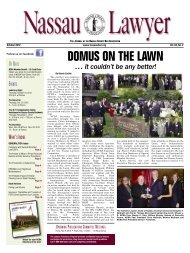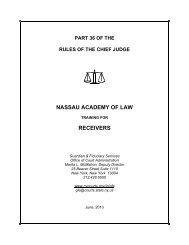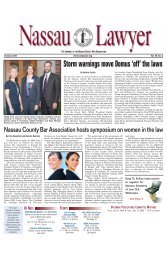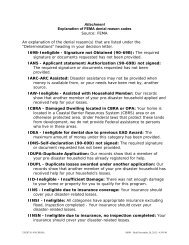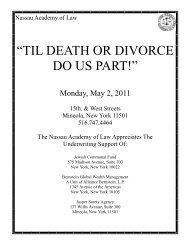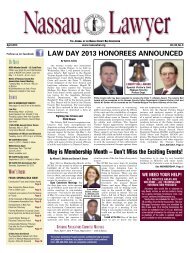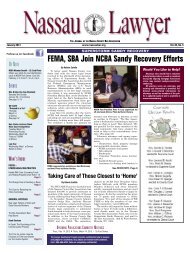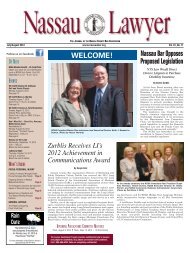443 F.3d 180 Page 5443 F.3d 180(Cite as: 443 F.3d 180)disputed that Berger and Mack paid out and loanedthe full amount, but plaintiffs alleged that pursuant toRobert Rosenstock's and Genser's instructions, Bergerand Mack disbursed some <strong>of</strong> the money in theloans to Rosenstock and Genser individually. Thedistrict court (Levy, M.J.) issued a memorandum andorder on September 30, 1996, which denied permissionto add new defendants and assert new claims.See Grace v. Rosenstock, 169 F.R.D. 473, 480-86(E.D.N.Y.1996) ("Grace V"). Judge Levy reasonedthat the new claims did not relate back to the originalcomplaint, in part because they set forth "a completelynew set <strong>of</strong> operational facts." Id. at 481. JudgeLevy also denied plaintiffs' arguments on equitabletolling and equitable estoppel, explaining, "althoughplaintiffs complain that they did not learn <strong>of</strong> the allegedfraudulent conveyances until late 1995, theyclearly could have learned <strong>of</strong> the note and mortgagetransactions earlier had they been more diligent innoticing depositions or seeking court interventionregarding discovery." Id. at 484.Judge Trager affirmed Judge Levy's order in its entirety,Grace v. Rosenstock, No. 85-cv-2039(E.D.N.Y. Nov. 7, 1996) ("Grace VI"), and on February28, 1997, plaintiffs were denied leave to take aninterlocutory appeal. On July 28, 1997, the partiesattended a status conference before the district court(Wolle, J.). According to plaintiffs, "the only partiesthat were then appearing before Judge Wolle werethe party <strong>of</strong> plaintiffs, plaintiff [sic ] Rosenstock, prose and Briggs Leasing by Mr. Rosenstock." Plaintiffsentered into a stipulation <strong>of</strong> settlement dated July 31,1997, as to their claims against defendants RobertRosenstock and Briggs. Rosenstock, who accordingto plaintiffs was judgment-pro<strong>of</strong>, executed the stipulationon behalf <strong>of</strong> himself for $6,912,288, and onbehalf <strong>of</strong> Briggs for $4,028,000. Neither Rosenstocknor Briggs had legal representation. Judge Tragerentered a judgment for these amounts against bothRosenstock and Briggs. Grace v. Rosenstock, No. 85-cv-2039 (E.D.N.Y. Aug. 15, 1997) ("Grace VII").The judgment declared as moot the state court proceedingsagainst both Rosenstock and Briggs. Id.After entry <strong>of</strong> the 1997 judgment, plaintiffs andGenser consented to have all further proceedings,including entry <strong>of</strong> any *186 judgment, conducted bya magistrate judge. The matter was referred to MagistrateJudge Levy. Following a bench trial, JudgeLevy dismissed the claims against Genser in theirentirety. See Grace v. Rosenstock, 23 F.Supp.2d 326,337 (E.D.N.Y. Oct.29, 1998) ("Grace VIII"). Plaintiffsappealed from the dismissal <strong>of</strong> their claims andwe affirmed the judgment on August 25, 2000. SeeGrace v. Rosenstock, 228 F.3d 40 (2d Cir.2000)("Grace IX"). In that case, we affirmed, inter alia, theorder denying leave to add claims and parties, issuedby Judge Levy in Grace V; the order dismissingplaintiffs' claims against Genser, issued by JudgeLevy in Grace VIII; and Judge Levy's denial <strong>of</strong> otherarguments advanced by plaintiffs, including equitableestoppel and equitable tolling. Id. at 52-55. [FN4]FN4. Although we did concede that the limitationsperiod had not yet begun to run as tothe DCL § 273-a claims, we nonetheless didnot reverse because the plaintiffs were foundto have waived their nonaccrual objection tothe magistrate judge's ruling. Grace IX, 228F.3d at 54.According to plaintiffs, writs <strong>of</strong> execution againstBriggs and Rosenstock were returned unsatisfied. InAugust 2002, plaintiffs commenced separate actionsin the Southern District <strong>of</strong> New York against Briggsand movants, using the unsatisfied 1997 judgment asa predicate to bringing fraudulent conveyance claimsagainst movants, under Section 273-a <strong>of</strong> DCL. SeeN.Y. CLS Dr & Cr § 273 (2006). Plaintiffs allegedthat notes, guarantees, and mortgages on real property<strong>of</strong> Briggs, given to movants between 1986 and1989, were made without fair consideration. [FN5]Plaintiffs argued that movants helped Robert Rosenstockloot the corporation by giving the loans directlyto Robert Rosenstock and other companies he owned.FN5. Although movants did receive proceeds<strong>of</strong> real estate sales made by Briggs,these payments were allegedly millions <strong>of</strong>dollars less than the amounts they hadloaned.On February 13, 2004, the first fraudulent conveyanceaction was transferred from the United StatedDistrict Court for the Southern District <strong>of</strong> New York(Berman, J.), to the United Stated District Court forthe Eastern District <strong>of</strong> New York. Grace v. BankLeumi Trust Co., No. 02-cv-6612(S.D.N.Y. Mar. 30,2004), 2004 U.S. Dist. LEXIS 5294 at *6 ("GraceX"). This had the effect <strong>of</strong> transferring the secondaction for fraudulent conveyance. Id. at *17. Judge© 2009 Thomson Reuters. No Claim to Orig. US Gov. Works.
443 F.3d 180 Page 6443 F.3d 180(Cite as: 443 F.3d 180)Berman reasoned that the proper venue was the EasternDistrict, the alleged fraudulent conveyances involvedreal property located in the Eastern District,the transfer promoted efficiency, and plaintiffs'choice <strong>of</strong> forum was entitled to little weight. He alsocalled the plaintiffs' choice <strong>of</strong> forum an attempt at"judge shopping." Id. at *13.In October 2002, movants had written to JudgeTrager to request a pre-motion conference, explainingthat they intended to file a motion to vacate the 1997judgment. In 2003, movants filed motions to vacate.The district court then issued a memorandum andorder, which addressed movants' arguments for vacatingthe judgment. Grace v. Rosenstock, No. 85-cv-2039 (E.D.N.Y. Oct. 4, 2004) ("Grace XI"). Thesereasons included the following: (1) Briggs was notrepresented by counsel when the settlement was entered;(2) Robert Rosenstock lacked power to confessjudgment against Briggs; (3) the amount <strong>of</strong> the defaultjudgment against Briggs exceeded the reliefsought against Briggs in the original complaint; and(4) the class was not notified <strong>of</strong> the settlement and afairness hearing was not held. See id. at 9.*187 Judge Trager vacated the 1997 judgment asvoid under Rule 60(b) <strong>of</strong> the Federal Rules <strong>of</strong> CivilProcedure. He explained that it is well-settled lawthat a corporation may appear in the federal courtsonly through licensed counsel; damages for a defaultjudgment should not be awarded without a hearing ora demonstration by affidavits establishing the facts;no inquest was held because the stipulation was thebasis for entry <strong>of</strong> judgment against Briggs; rescissorydamages are not available for freeze-out mergers; theamount was both excessive and different in kind fromthat sought in the complaint; and there was evidence<strong>of</strong> collusion between Rosenstock and plaintiffs to thedetriment <strong>of</strong> movants. Grace XI, at 9-20. JudgeTrager concluded, "[i]n any event, movants shouldnot be required to suffer further legal costs to bring asummary judgment motion, while plaintiffs pressforward with a 19-year-old litigation fraught withprocedural errors and excessive, if not completelymeritless, claims." [FN6] Id. at 20. He then dismissedthe two fraudulent conveyance actions, because therewas no longer a judgment on which to collect. Gracev. Bank Leumi, No. 04-cv-0708 (E.D.N.Y. Oct. 6,2004) ("Grace XII"); Grace v. Schwartz, No. 04-cv-1622 (E.D.N.Y. Oct. 14, 2004) ("Grace XIII").FN6. Although the merits <strong>of</strong> this case werenot an issue, Judge Trager neverthelessnoted that "even if the Judgment were upheld,plaintiffs would probably not survive amotion for summary judgment," Grace XI,at 19. He explained that he was skepticalthat Bank Leumi did not give fair considerationfor the mortgages. Id. at 20. He wrotethat if Briggs was not a defendant in an actionfor money damages when the conveyanceswere made, DCL § 273-a did not applyand therefore the judgment could not affectmovants. And he found that the transfersto Mack, Berger, and Apex occurredwhile this action was administrativelyclosed. Id. Therefore, if they had checkedthe court documents (which movants saidthey did), they would have found that thecase was administratively closed because <strong>of</strong>a pending settlement. Id.Plaintiffs filed an appeal to this Court on November1, 2004.DiscussionI. JurisdictionWe have jurisdiction over the appeals <strong>of</strong> Grace XI,Grace XII, and Grace XIII based on 28 U.S.C. §1291, the notices <strong>of</strong> appeal having been filed on November1, 2004. The district court had jurisdictionover Grace XI under 28 U.S.C. § 1331, as it was anaction arising under federal law. Jurisdiction inGrace XII and Grace XIII was based on Rule 69 <strong>of</strong>the Federal Rules <strong>of</strong> Civil Procedure, because theyconcerned the collection <strong>of</strong> a federal judgment. SeeEpperson v. Entm't Express, Inc., 242 F.3d 100, 107(2d Cir.2001); Fed.R.Civ.P. 69.II. Standard <strong>of</strong> Review[1] Federal Rule <strong>of</strong> Civil Procedure 60(b) decisionsby district courts are accorded deference. We reverseonly where there has been an abuse <strong>of</strong> discretion. See<strong>Law</strong>rence v. Wink (In re <strong>Law</strong>rence), 293 F.3d 615,623 (2d Cir.2002); Nemaizer v. Baker, 793 F.2d 58,61-62 (2d Cir.1986). [FN7]FN7. When we recognized in Central VermontPublic Service Corp. v. Herbert, 341F.3d 186 (2d Cir.2003), that "[a]lmost everyCircuit has adopted de novo review <strong>of</strong> Rule60(b)(4) motions, and we know <strong>of</strong> no Circuit© 2009 Thomson Reuters. No Claim to Orig. US Gov. Works.
- Page 1 and 2:
Nassau Academy of LawCLE Live Class
- Page 3 and 4:
McKinney's Debtor and Creditor Law
- Page 5 and 6:
McKinney's Debtor and Creditor Law
- Page 7 and 8:
McKinney's Debtor and Creditor Law
- Page 9 and 10:
McKinney's Debtor and Creditor Law
- Page 11 and 12:
McKinney's Debtor and Creditor Law
- Page 13 and 14:
McKinney's Debtor and Creditor Law
- Page 15 and 16:
McKinney's Debtor and Creditor Law
- Page 17 and 18:
McKinney's Debtor and Creditor Law
- Page 19 and 20:
BAKER & HOSTETLER LLP45 Rockefeller
- Page 21 and 22:
usiness of defendant Bernard L. Mad
- Page 23 and 24:
BACKGROUND, THE TRUSTEE, AND STANDI
- Page 25 and 26:
Madoff who received fraudulent tran
- Page 27 and 28:
ased on fictitious profits and for
- Page 29 and 30:
28. BLMIS funds were also used to p
- Page 31 and 32:
Madoff, and her niece, Shana Madoff
- Page 33 and 34:
42. Ruth Madoff was never an employ
- Page 35 and 36:
FIRST CAUSE OF ACTIONTURNOVER AND A
- Page 37 and 38:
66. At the time of each of the Two-
- Page 39 and 40:
Transfers; (b) directing that the S
- Page 41 and 42:
EIGHTH CAUSE OF ACTIONUNDISCOVERED
- Page 43 and 44:
TENTH CAUSE OF ACTIONDISALLOWANCE O
- Page 45 and 46:
111. Mrs. Madoff benefited from the
- Page 47 and 48:
WHEREFORE, the Trustee respectfully
- Page 49 and 50:
2(c)(3): (a) preserving the Subsequ
- Page 51 and 52:
302 B.R. 760 Page 1302 B.R. 760(Cit
- Page 53 and 54:
302 B.R. 760 Page 3302 B.R. 760(Cit
- Page 55 and 56:
302 B.R. 760 Page 5302 B.R. 760(Cit
- Page 57 and 58:
302 B.R. 760 Page 7302 B.R. 760(Cit
- Page 59 and 60: 302 B.R. 760 Page 9302 B.R. 760(Cit
- Page 61 and 62: 302 B.R. 760 Page 11302 B.R. 760(Ci
- Page 63 and 64: 302 B.R. 760 Page 13302 B.R. 760(Ci
- Page 65 and 66: 302 B.R. 760 Page 15302 B.R. 760(Ci
- Page 67 and 68: 302 B.R. 760 Page 17302 B.R. 760(Ci
- Page 69 and 70: 302 B.R. 760 Page 19302 B.R. 760(Ci
- Page 71 and 72: 394 B.R. 721 Page 1394 B.R. 721, 50
- Page 73 and 74: 394 B.R. 721 Page 3394 B.R. 721, 50
- Page 75 and 76: 394 B.R. 721 Page 5394 B.R. 721, 50
- Page 77 and 78: 394 B.R. 721 Page 7394 B.R. 721, 50
- Page 79 and 80: 394 B.R. 721 Page 9394 B.R. 721, 50
- Page 81 and 82: 394 B.R. 721 Page 11394 B.R. 721, 5
- Page 83 and 84: 394 B.R. 721 Page 13394 B.R. 721, 5
- Page 85 and 86: 394 B.R. 721 Page 15394 B.R. 721, 5
- Page 87 and 88: 394 B.R. 721 Page 17394 B.R. 721, 5
- Page 89 and 90: 394 B.R. 721 Page 19394 B.R. 721, 5
- Page 91 and 92: 394 B.R. 721 Page 21394 B.R. 721, 5
- Page 93 and 94: 397 B.R. 642 Page 2397 B.R. 642(Cit
- Page 95 and 96: 397 B.R. 642 Page 4397 B.R. 642(Cit
- Page 97 and 98: 397 B.R. 642 Page 6397 B.R. 642(Cit
- Page 99 and 100: 397 B.R. 642 Page 8397 B.R. 642(Cit
- Page 101 and 102: 397 B.R. 642 Page 10397 B.R. 642(Ci
- Page 103 and 104: 397 B.R. 642 Page 12397 B.R. 642(Ci
- Page 105 and 106: 397 B.R. 642 Page 14397 B.R. 642(Ci
- Page 107 and 108: 443 F.3d 180 Page 2443 F.3d 180(Cit
- Page 109: 443 F.3d 180 Page 4443 F.3d 180(Cit
- Page 113 and 114: 443 F.3d 180 Page 8443 F.3d 180(Cit
- Page 115 and 116: 443 F.3d 180 Page 10443 F.3d 180(Ci
- Page 117 and 118: 443 F.3d 180 Page 12443 F.3d 180(Ci
- Page 119 and 120: Page 2257 A.D.2d 526, 684 N.Y.S.2d
- Page 121 and 122: Page 4257 A.D.2d 526, 684 N.Y.S.2d
- Page 123 and 124: Page 6257 A.D.2d 526, 684 N.Y.S.2d
- Page 125 and 126: 770 N.Y.S.2d 421 Page 22 A.D.3d 780
- Page 127 and 128: Page 14 A.D.3d 495, 773 N.Y.S.2d 71
- Page 129: Page 34 A.D.3d 495, 773 N.Y.S.2d 71
- Page 132 and 133: 780 N.Y.S.2d 409 Page 29 A.D.3d 553
- Page 134 and 135: Page 134 A.D.3d 231, 824 N.Y.S.2d 3
- Page 136 and 137: Page 334 A.D.3d 231, 824 N.Y.S.2d 3
- Page 138 and 139: Page 2991 F.2d 31(Cite as: 991 F.2d
- Page 140 and 141: Page 4991 F.2d 31(Cite as: 991 F.2d
- Page 142 and 143: Page 6991 F.2d 31(Cite as: 991 F.2d
- Page 144 and 145: FRAUDULENT TRANFERENCESRonald M. Te
- Page 146 and 147: Nursing home case_ Transfer of pers
- Page 148 and 149: Sections 548 and 544 work in concer
- Page 150 and 151: U.S. Supreme CourtBFP v. Resolution
- Page 152 and 153: example, from net 15 to COD; or cha
- Page 154 and 155: Bankruptcy Code Section§ 548. Frau
- Page 156: Ron Terenzi is a founding partner a



